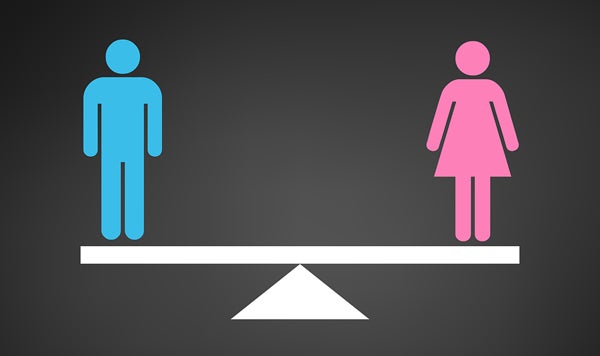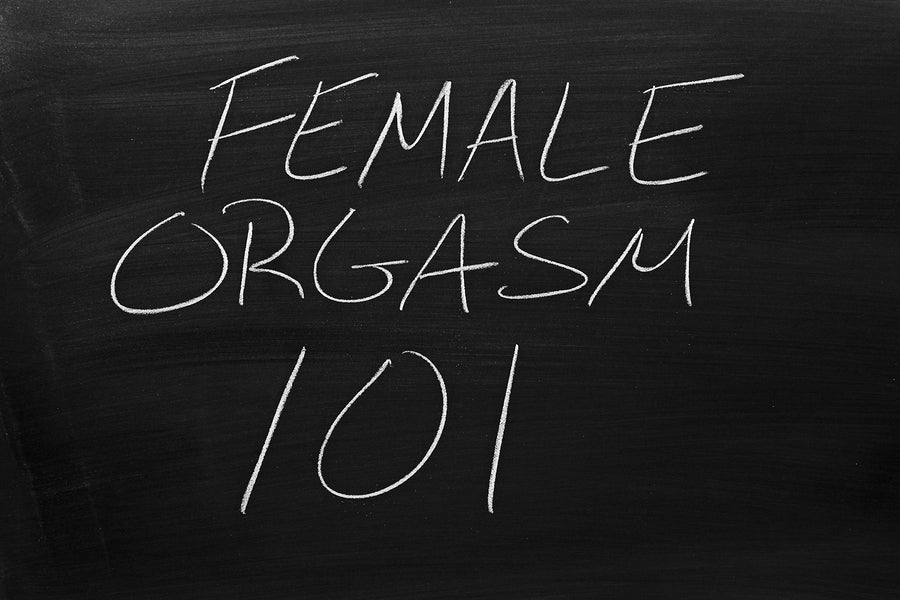Society has come a long way when it comes to gender equality, but there's the orgasm gap.
Statistically, women report fewer orgasms than men, and the gap exists across all sexual orientations.
Why the Orgasm Gap Exists
According to one study, 75 percent of heterosexual men say they always orgasm during sex, compared to just 33 percent of heterosexual women. The gap is a little narrower between lesbian women and gay men, but there’s still a difference. In the same study, 59 percent of lesbian women say they always orgasm during sex, whereas 66 percent of gay men say they do. Among those who identify as bisexual or transgender, 36 percent of women always orgasm, compared to 66 percent of men.

Here are a few of the major theories:
Too Much Focus on Penetrative Sex
Numerous studies and surveys show that Western culture is by and large goal-oriented. In the realm of sex, this typically translates to a focus on results rather than the process of getting there. Male ejaculation equals orgasm, and for some couples that means curtains down on a sexual encounter. Once they’ve popped, the fun… well, it just stops.
For many reasons, this leaves their partner wanting — and it helps create the orgasm gap.
The reason for this is largely biological. When it comes to male vs. female orgasm, it’s much more difficult for women to orgasm due to penetrative sex alone. According to the sex education experts, this can be a problem, as 80 percent of women don’t orgasm through just intercourse.
Fortunately, there are ways to ensure women experience mind-blowing orgasms during sex.
For one, partners can bring more (and better) foreplay into the bedroom. What that means for everyone will be different — but we’d suggest maybe a sexy massage, more talk (and dirtier — if that’s your thing), exploring kink and throwing a few erotic games into the mix.
And yes — lube. And no, we’re not just saying that because we’re ASTROGLIDE — extra lube is excellent for helping stimulate the clitoris.
Stereotypes About Female Sexuality Help Reinforce the Orgasm Gap
Despite the gender revolution of the 1960s, many misperceptions about female sexuality remain. When researchers ask the general public about sexual desire between the sexes, most people assume that men naturally have higher sex drives.
However, sex researchers say this is inaccurate. According to Lisa Diamond, a professor of psychology and gender studies at the University of Utah, “women don’t have lower sexuality than men. What they have are more variable patterns.”
Diamond says this can sometimes be due to fluctuations in a woman’s hormones during her menstrual cycle. At peak ovulation, a woman’s sex drive may equal or even exceed a man’s.
Sex Ed Is Lacking
It’s an understatement to say that comprehensive sex education in the United States is lacking. In many states, sex ed for girls is limited to scare tactics that link sex to disease and unplanned pregnancies.
In short: don’t have sex — and if you do, it won’t be fun and you’ll be taking a big risk.
Even worse, teens (and adults) aren’t always familiar with their own anatomy. According to researchers in the Journal of Urology, “The anatomy of the clitoris has not been stable with time, as would be expected. To a major extent its study has been dominated by social factors.”
Likewise, many eager teenagers end up running to the Internet (and often to porn) in order to see what the fuss is about. While we don’t necessarily have a problem with porn, when a teenager’s entire understanding of sexuality is based on something that’s shot and edited to primarily appease men — well, you’re going to have a problem.
The good news is that sexual education is getting better — especially outside the classroom. As an adult, you can ramp up your sex ed and your sex life by checking out the facts you weren’t taught in school.
4 Ways to Close the Orgasm Gap

If you’re willing to put in the effort, you can close the orgasm gap in your bedroom and your relationship. It might take some practice, but the rewards can make the process worthwhile.
1. Explore 12 Kinds of Female Orgasms
The penis-in-the-vagina sex you learned about in sex ed isn’t the only game in town. Claire Lampen at Women’s Health talked to Dr. Sheila Loanzon, a board-certified OB/GYN who says there are no less than 12 different kinds of orgasms. Here’s a quick rundown.
1. Clitoral Orgasm
If the female orgasm has been eluding you, it might be because you don’t know that much about the clitoris.
Although small (though not as small as you think!), this organ is a powerful part of the body, and there’s a lot more to it than you might realize. Here are 8 things you might not know about the clitoris, and some tips for maximizing your pleasure during clitoral orgasms.
2. G-spot Orgasm
As we explain in our post about the female G-spot, the spot itself is a sensitive collection of structures on the front wall of the vagina. Stimulating this area of the body can make for earth-shattering orgasms, so it’s definitely worth checking out.
3. Blended Orgasm
Blended orgasms are pretty much what they sound like: a combination of two or more different types or orgasm. For example, you can combine a clitoral and G-spot orgasm, or you can mix clitoral stimulation with nipple massage. The possibilities — and the pleasure — are endless.
4. Anal Orgasm
According to Dr. Loanzon, “there are shared nerves from the anterior wall of the rectum to the vagina.” By stimulating these nerves, you can create intensely pleasurable orgasms.
5. A-spot Orgasm
Damian Jacob Sendler, chief of sexology and clinical research programs at Felnett Health Research Foundation for North America, told Women’s Health that the A-spot is located around the entrance to the uterus. Much like the G-spot, it can be a little difficult to find. Dr. Sendler says most people have success stimulating this area through rear-entry sex.
6. C-spot Orgasm
The C in C-spot stands for your cervix, and it’s possible to enjoy an incredible orgasm by stimulating this part of the body. However, experts recommend being very turned on before trying it, as the cervix can be quite sensitive.
7. U-spot Orgasm
U-spot orgasms stimulate the urethra, which sits just below the clitoris. Because the urethra is a muscle, it’s sensitive to stimulation, which can turn into sexual pleasure with the right kind of touch.
8. Nipple Orgasm
The nipples are an erogenous zone for many people, and they can even lead to incredible orgasms.
9. Coregasm
If you’re a fitness junkie, a coregasm might be for you. Also known as exercise-induced orgasms, they occur during workouts. Experts aren’t really sure why, but they believe it might have something to do with vibrations in the abdominal and pelvic muscles.
10. Skin Orgasm
If you’ve ever experienced goosebumps or pleasurable tingles when someone runs their hands along your skin, you might be feeling the beginnings of a skin orgasm. In some people, this frisson feeling can actually lead to climax.
11. Breath Orgasm
Believe it or not, you can breathe your way to an orgasm. Jess, ASTROGLIDE’s own sexologist, explained in Self that deep, focused breathing can enhance orgasms.
12. Fantasy Orgasm
The brain is a powerful and complicated organ, so it’s no wonder it’s capable of producing some fairly irresistible fantasies. If you have a good imagination, experts say you can take your daydreams into orgasm territory with nothing more than a bit of naughty thinking.
2. Masturbate More

It doesn’t take two to have an exciting, empowering sex life. Masturbation is good for your health and your sexual encounters with your partner.
There are numerous health benefits associated with masturbating, including a boost of endorphins, reduced anxiety, a better sex life and increased blood flow to the vagina, which can lessen irritation and dryness during sex.
And, of course, it’s also fun — which is a good enough reason to do anything, as far as we’re concerned.
Of course, friction can stop a masturbation session in its tracks, which is why you might want to consider adding lube to the mix. There are many ways to use lube, including solo play. Masturbating can help you explore your own body without fear of judgment, as well as help you learn what types of touch and stimulation help you experience the most pleasure.
3. Sex Toys Can Help Erase the Orgasm Gap

Some people think sex toys are for solo sessions only, but that doesn’t have to be the case. In fact, introducing toys into the bedroom can be a great way to amplify your pleasure and help ensure that everyone walks away feeling satisfied.
Using toys in the bedroom can also take some of the pressure off when it comes to helping your partner orgasm. Toys come in all shapes and sizes, and many of them emit a range of vibrations you can adjust according to your partner’s needs and desires.
4. Communicate with Your Partner
Want to do your part in closing the orgasm gap? Start demanding that you get what you need.

It sounds simple, but experts say women are far less likely than men to verbalise their sexual desires — or speak up when they aren’t satisfied during sex. According to sex educator Pamela Madsen, many women are stuck in the mindset that only “bad girls” speak their minds when it comes to sexual gratification.
As for men, many operate with the misunderstanding that all women want the same thing in the bedroom. Madsen says, “The fact is that when a man has sex with one woman he has had sex with ONE woman. All women are different. We are wired differently and even our genital anatomy can vary between women.”
Slam the Door on the Orgasm Gap
The orgasm gap doesn’t have to exist.

